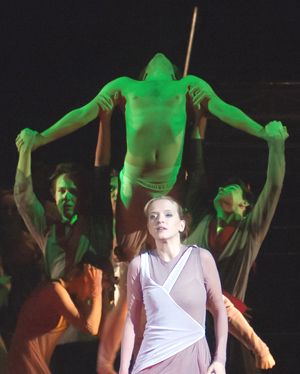Jesus in theater
In its 39th season the company of the Dnipropetrovsk Theater of Opera and Ballet captivates the audience with an unheard-of choreographic show based on the music of famous American composer John Debney
The production Jesus (libretto, choreography, and staging) was created by Oleh Nikolaiev. The creative team of the production, dedicated to evangelical stories, includes conductor Yurii Porokhovnyk, choirmaster Valentyn Puchkov-Sorochynsky, artist Daria Bila, the orchestra, the chorus, the ballet, and the theater’s singers (the music was composed by John Debney, one of the most popular composers and conductors of the US). Incidentally, Nikolaiev has managed to do a seemingly impossible thing: he obtained the permission of the Hollywood celebrity to use the composer’s music piece gratis in his own large-scale production. However, the author set one condition – any audio or video recording of the play should be forbidden, and the Dnipropetrovsk Theater had to agree to this. The work on the production lasted for about a year: Nikolaiev added to the American’s music the pieces by Johann Sebastian Bach and Sergei Prokofiev, as well as some other composers.
The title of the premiere is rather stupefying: Jesus? The same Jesus? A similar thing took place in Russia at the turn of last century, when a famous philosopher Vladimir Solovyov appealed to Synod for the permission to publish Russian-language edition of French writer Joseph Ernest Renan’s Life of Jesus. The Ober-Procurator Konstantin Pobedonostsev, a man of extremely conservative beliefs, was outraged: “How could you even come up with such idea?” The thinker parried, “We need to tell people about Christ at last.”
By turning to the image of Jesus, the theater is also pursuing an educational goal. Clearly, it is implementing it by way of theater performance. The Dnipropetrovsk audience has an opportunity to see how it is done in the play. The premiere took place in the city on September 28, the following performances will be held on October 13, 16, and 17.
The author of the play Oleh Nikolaiev shared with The Day the reasons which prompted him to create Jesus.
“Jesus’s mysteries (which cannot be counted) have been exciting the humanity for many centuries. Whereas Christ’s first pupils were simple fishermen, later the greatest minds and creators of human civilizations bowed down before the Cross. As a reminder, the phenomenon of Christ’s arrival was founded in the 20th years of Caesar August’s rule in Judea. It was then that in the village of Nazareth a Galilean maiden heard the annunciation: ‘You will give birth to a son who you will name Jesus.’ The paradox of his arrival is that it was unbelievable, yet historically real. Time reveals all the new facets of his personality.
“You know, it has taken me the longest to prepare for this production, compared to other works of mine. I was thinking and weighing: should I take it or not, to be or not to be? After all, I made a decision to stage it. I hope the production arouses interest of both believers and worldly people. I ascribe myself to the latter: theater is a secular establishment, if not to say a sinful one. There were times when actors were buried beyond the cemetery. For me Christ is a planetary figure, unending in time and connected with all of us. The world history and culture in many ways started from the Nativity. The human things become immensely broader: the notion of good and evil emerges; light becomes divided from darkness; the cruel laws of paganism vanish, such as an eye for an eye, and a tooth for a tooth; the strongest fall, the weakest win. But Christianity does not bring only evil to the world. Jesus has opened the way to God, not only formidable, frightening, and punishing. Being mighty and incomprehensible, the Creator still appeared a personality with whom one could have some relations, relying on His love, understanding, and forgiveness.”
What argument determined your final choice?
“John Debney’s music was the first and the final argument. From the very first time I listened to it, it captivated me: I saw it and I felt that it penetrated all the pores of my essence. It seemed to me I would go crazy unless I staged a production to it. The ancient people used to say: ‘music creates the space where our souls dwell.’ According to Debney, the music to Mel Gibson’s movie The Passion of the Christ was the most difficult task in his life. And it was the best of all of his creations in Hollywood. ‘I felt every lash of the whip on Christ’s skin. I believe that in Jesus the human nature reached perfection. I am happy that I have gone through this unbelievable trial,’ the composer admitted. This is powerful music! It is also beautiful and charismatic (Debney was nominated for the Academy Award for the soundtrack to The Passion of the Christ).”
Jesus’s part in the premiere was performed by the 20-year-old dancer Yevhen Dankov-Beliansky: though he is younger than his hero was when he was crucified and resurrected (and the largest part of the production is dedicated to those events), his pure look and accurate movements help him enter into this image which is difficult for any artiste. The choice of other performers is no less successful: at the premiere the role of the Mother of the Savior was played by Valeria Ilchenko, Maria Magdalena’s – Olena Pecheniuk, Judas’s – Serhii Badalov, Pontius Pilatus’s – Anton Sihidin, Herod Antipas’s – Yurii Voinikov. Besides choreography the play includes a few singing parts, exquisitely performed by the soloists Olena Bokach, Zoia Kaipova, and Timur Parulava.






